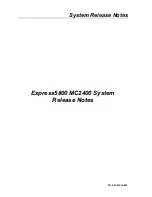
CHAPTER 1 UNIX PRINTING
1-6
HP/UX Configuration
In the case of HP/UX10.xx, the sam program is used to set up the remote printer.
The steps are as follows:
1. Execute the sam program. From the list of options, select Printers and
Plotters
2. Select LP Spooler
3. Select Printers and Plotters
4. Select Actions and then Add Remote Printer/Plotter
5. Enter any name as the Printer Name (this will be the name of the print
queue)
6. Enter the IP address of the print server as the Remote System Name
7. Enter the desired print server service name as the Remote Printer Name
8. Check the box next to Remote Printer is on BSD system
9. You may accept the default values for the remaining items.
10. Click OK to configure the printer
You should now be able to print using the lp-d command with the printer name.
If you are using the HP distributed print service, the configuration procedure is
slightly different because you are sending the print jobs to a file server, which in turn
spools the job to the print server. You must therefore know the name of the file
server (spooler host) in addition to the above information. You will add a physical
and a remote printer and a remote printer, and then assign a logical printer to the
remote printer (a unique name that does not match any other name). To print, use the
lp -d command with the logical printer name.
Earlier versions of HP/UX use similar procedures to 10.xx users:
1. Enter sam and select Peripheral Devices and then Add Remote Printer (not
Networked printer)
2. Enter the following remote printer settings (the other settings do not matter):
3. Line printer name (user-selectable)
4. Remote system name (the print server name; must match what is in hosts
file or use print server IP address)
5. Remote printer queue (Printserver binary or text service name, e.g.
BINARY_P1 or TEXT_P1).
6. Remote Printer is on a BSD System (Yes)
















































